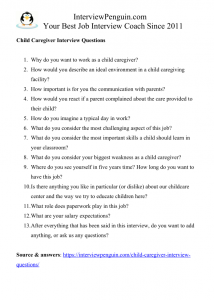Taking care of young children is a beautiful job with a lot of responsibility. People develop 90% of their formulas of thinking in their early childhood. How we spend this time of our life, whether we experience love, care, compassion, or opposite emotions from people who take care of us, determines (at least to certain extend) the way in which we will act to others and to our environment once we grow up.
Let’s have a look at 13 questions you may face while interviewing for a job with a child care provider. I will try to help you find the right answers to most questions. When you are not sure what to say, however, always think about the child and their well-being. What action should you take in a presented situation, to ensure the child is safe, happy, and a learns something new?
Table of Contents
Why do you want to work as a child caregiver?
Saying that you love children, know how to work with them, and want to be around them is a typical answer to this question. It’s not a bad one, and you won’t disappoint your interviewers, but you can do better.
You can emphasize the importance of childhood development in early years, the impact it will have on the rest of their lives, and subsequently on the entire community, society, world… Basically you see the meaningful purpose of this job, and at the same time you love children, and that’s the reason why you decided to apply for a job of a child caregiver.
How would you describe an ideal environment in a child caregiving facility?
You can look at this question from several angles. One is denominating several characteristics of such environment, another one saying how children should feel in the place.
In the first case, you can say that an ideal environment for children is safe, encouraging, positive, loving, and sensory rich. In terms of their feelings, you can say that in an ideal environment their physical, emotional and spiritual needs are recognized and honored, they feel loved and respected.
You can add that you will try to create such an environment while working as a child caregiver, and hope that children will thrive in your company.
How important is for you the communication with parents?
Give it the utmost importance. Though often busy with work or other commitments, parents want to play their part in the early education of their beloved children.
What’s more, the castles you manage to build in the mornings can fall into ruins in the afternoons, if the two of you do not cooperate. At the end of the day, a parent (or guardian) is the first and the most important role model of each child.
Say that you plan to talk about everything with the parents. What’s more, you hope to build a relationship of trust with them, so they may also share things with you that will help you understand their child better.
How would you react if a parent complained about the care provided to their child?
Ensure the interviewers that you will take each feedback seriously. You want to try your best in work, and create an environment in which each child can thrive. But you are just a human being and can make a mistake, or misunderstand a child, or some situation in a classroom.
You can even take it one step further, saying that you’ll be happy to hear a complaint from a parent. Such feedback helps you to improve in your work of a child caregiver, and we learn then most from our own mistakes. Of course once we learn from them we won’t repeat them again…
Say that you will carefully and patiently listen to their words, try to understand their point of view, apologize, and just then explain your point of view–if it differs from theirs, for example if their child did not say the entire truth.
How do you imagine a typical day in work?
The most important thing is to describe the variety of the job. Teaching is one part, playing another. Eating and changing diapers (when needed) also belongs to the work of a child caregiver. You should also not imagine leaving at 3pm, because the parents are still at work at the time. You can say something like the following, just adjust your answer to your place of work and age of children and add more details:
- I imagine arriving early, perhaps before 7, so parents can drop the children in the place before going to work.
- Children clean their hands; if we provide breakfast, they will eat, and than we talk informally, letting them share their news and referring to the topic of the day, week, or month.
- After that it’s learning time. In a creative and engaging way, such as painting, playing, working with simple puzzles, etc. we work on the topic of the day, trying to help them develop their basic cognitive functions, and prepare them for their school time a few years down the road.
- A mid-morning snack or toilet time can be the part of the routine, we help children with learning toilet habits, change diapers when needed, etc.
- Playing time and lunch follows. After lunch they can have a short nap, 1 hour for example, again this depends on the center and also on individual needs of each child.
- Some simple learning and playing activities follow in the afternoon. They can take place both indoors (table games, drawing, simple activities to develop their creativity) or outdoors (walking discovering the fascinating world of nature, enjoying a time on a playground).
- Parents slowly arrive and take their children back home…
Special Tip: Download the list of all questions in a one page long PDF, print it, and practice your interview answers anytime later:

What do you consider the most challenging aspect of this job?
It’s important to show the interviewers that you do not wear pink glasses, and do not imagine an easy ride as a child caregiver. Certainly this is a wonderful job, but a day in a childcare center always presents some challenges. You should see them realistically.
You can refer to several challenges in your answer. Working with a spoiled child–who won’t listen to your orders, won’t participate in the activities, and may even bother other children in a classroom is one of such challenges. More often than not, you will have at least one such child in your classroom.
Dealing with a difficult parent (someone who remained a spoiled child in their adult life) is another challenge. Some parents may always complain, regardless of the progress you achieve with their child. Hearing some rude words on your address can definitely be hard emotionally.
Another challenge is to remain positive, loving and creative in the classroom, even when you experience a difficult time in your personal life, or simply have a bad day. And nobody can avoid such days completely.
Try to talk openly about the challenges your new job presents. You are aware of them, you will try your best to overcome them, and you also hope to get some help and support from your colleagues in the childcare center, or from the director of the place.
What do you consider the most important skills a child should learn in your classroom?
Try to focus more on healthy habits and attitudes to other people than on particular skills such as reading or drawing. If a child learn to respect other children in the classroom and share with them, if they learn to express their feelings and emotions, and develop their basic fine motor skills, they will have a great starting position once they start at the elementary school.
Children do not have to learn to write their name or read a simple book while still in the childcare facility. It is a plus, it can help, but at the end of the day that’s what they will learn while attending elementary school. Role of preschool education is different…
You can even point out to personal hygiene, and things like respecting nature and caring for environment, which definitely are the topics of the day and something we should try to teach the children from a very young age.
Other questions you may face in your child caregiver interview
- What do you consider your biggest weakness as a child caregiver?
- Where do you see yourself in five years time? How long do you want to have this job?
- Is there anything you like in particular (or dislike) about our childcare center and the way we try to educate children here?
- What role does paperwork play in this job?
- What are your salary expectations?
- After everything that has been said in this interview, do you want to add anything, or ask us any questions?
Conclusion, next steps
Interview for a job of a Child Caregiver belongs to interviews with average difficulty. You typically won’t compete with many other women for the job, which makes your situation easier. You may even be the only job candidate.
But it doesn’t mean that they will automatically hire you. You will need to present the right attitude towards children and education, and also realistic expectations about the job. Read this article once again, and try to prepare a short answer to each question. Practice your answers, and do a good research about the childcare provider. If you spend enough time preparing for this interview, you should succeed. I wish you good luck! Matthew
May also interest you:


